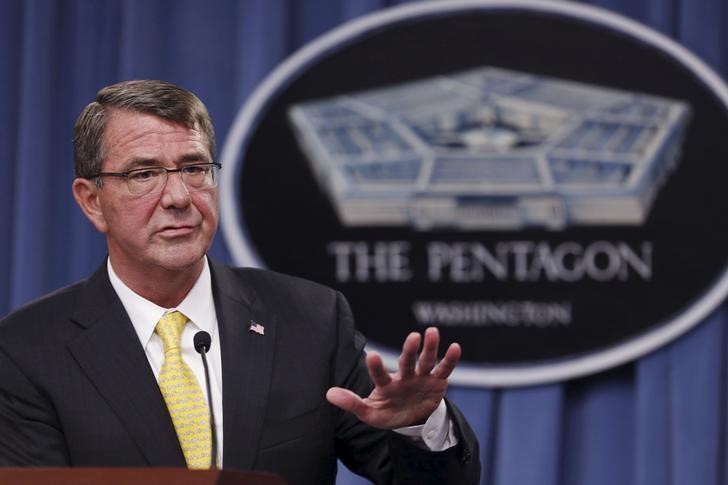Investing.com’s stocks of the week
By David Alexander
WASHINGTON (Reuters) - Defense Secretary Ash Carter said on Wednesday he expected President Barack Obama to veto the annual defense policy bill currently making its way through Congress because it seeks to avoid budget caps by padding the war-funding account.
Carter told a Pentagon news briefing that he and other presidential advisers had already recommended that Obama veto the National Defense Authorization Act if it remains in its current form.
The bill, which is written by the Armed Services Committees in both the House of Representatives and the Senate, sets defense policy and authorizes new programs and spending. Appropriation of money is done through spending bills written by the Appropriations Committees.
"(Obama) has already indicated that if it were presented to him in the form in which it now appears it is going to be presented to him, it is going to be vetoed," Carter said. "So, yes, that is unchanged."
Carter said he had a number of objections to the compromise bill unveiled on Tuesday. The measure would authorize $612 billion in defense spending, including $90 billion for Overseas Contingency Operations (OCO), or war funds.
Obama had sought a base Pentagon budget of $534 billion, well in excess of the $499 billion federal spending cap for 2016. He also sought $51 billion in war funds.
To avoid breaking the spending caps while still giving the president the level of funding he sought, Republicans on Capitol Hill reduced the base budget and added extra money to the war fund, which is not restricted by federal spending limits.
"It attempts to evade the question of overall fiscal responsibility with the so-called OCO gimmick, which is objectionable to me and to others in other agencies," Carter told reporters.
Obama has urged Congress reach a compromise that would find additional funds for both defense and other departments that have been stretched by the spending limits. He has resisted letting lawmakers boost defense spending without resolving the bigger issue.
Carter also objected to the bill because it rejected cost-saving reforms the Pentagon has been pushing for several years.
"Billions of dollars a year worth of reforms were disallowed," Carter said. "That's not OK with me because that is taking dollars that I already regard as short for national defense and using them in a way which we ... have determined is not in the national interest."
